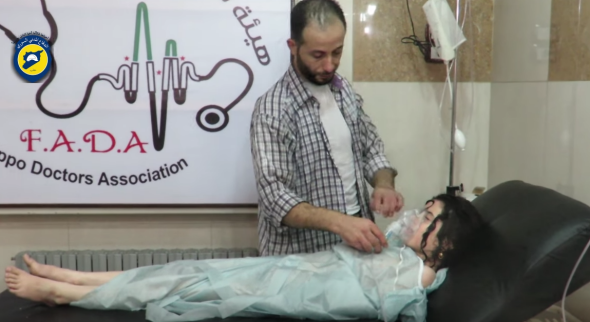-
Tips for becoming a good boxer - November 6, 2020
-
7 expert tips for making your hens night a memorable one - November 6, 2020
-
5 reasons to host your Christmas party on a cruise boat - November 6, 2020
-
What to do when you’re charged with a crime - November 6, 2020
-
Should you get one or multiple dogs? Here’s all you need to know - November 3, 2020
-
A Guide: How to Build Your Very Own Magic Mirror - February 14, 2019
-
Our Top Inspirational Baseball Stars - November 24, 2018
-
Five Tech Tools That Will Help You Turn Your Blog into a Business - November 24, 2018
-
How to Indulge on Vacation without Expanding Your Waist - November 9, 2018
-
5 Strategies for Businesses to Appeal to Today’s Increasingly Mobile-Crazed Customers - November 9, 2018
Assad Troops Accused of Dropping Chlorine Bombs
The Syrian regime has faced a series of accusations throughout the five-year conflict of indiscriminate bombings of civilians and use of sarin and chlorine gas, while Damascus has accused its opponents of also attacking civilians and using mustard gas.
Advertisement
Syrian regime helicopters dropped a number of barrel bombs on opposition-held parts of Aleppo’s Sukkeri district on Tuesday, leaving scores of residents injured, local civil defense sources said.
Video released by the Syrian Civil Defense, also known as the White Helmets, shows men hosing down civilians, many of them children.
An official in Syria’s rebel-held Aleppo said Wednesday that at least one person had died from a suspected chlorine attack reported a day earlier.
The British-based Syrian Observatory for Human Rights, which tracks the violence using sources on the ground, said medical sources had reported 70 cases of suffocation.
Last month a United Nations inquiry found that Syrian government forces were responsible for two toxic gas attacks in 2014 and 2015 involving chlorine.
Aleppo province has witnessed attacks ranging from air strikes, barrel bombs and mortar attacks during Syria’s war.
If sustained, the advance would reverse almost all the gains rebels made in a sudden push last month, tighten the blockade over rebel-held eastern Aleppo and ease access for the army into government-held western districts through the city’s south.
While reports of the attack could not be independently verified by media outlets, a handful of aid groups and hospital workers in Aleppo said helicopters flew over Sukkari, an eastern suburb, and dropped barrels of chlorine.
Mohammed Abu Jaafar, head of a forensic department in the rebel-held part of Aleppo, said the teenager had died of suffocation and respiratory burns.
Chlorine was not included in the deal, however, because it is considered a dual-use chemical, as it has applications other than chemical weaponry.
President Bashar al-Assad’s regime has been backed by Russian airpower.
Children were left screaming in agony after the government reportedly dropped chlorine on the besieged Syrian city of Aleppo.
Syria’s five-year war has killed hundreds of thousands and displaced 11 million, half of Syria’s pre-war population, while drawing in world and regional powers, inspiring jihadist attacks across the world and sparking an worldwide refugee crisis. A UN-led investigation in August found the government had used chlorine on at least two occasions. Assad has allied with other Sunnis, Kurds and Christians.
However, observers say the Syrian military’s campaign also aims to recapture areas in the northern and southern countryside of Aleppo in the face of Turkey’s perceived attempts to establish a safe zone in northern Syria.
Advertisement
On Wednesday, the High Negotiations Committee (HNC) said the proposed process would start with six months of negotiations aimed at setting up a transitional administration made up of figures from the opposition, the government and civil society.





























